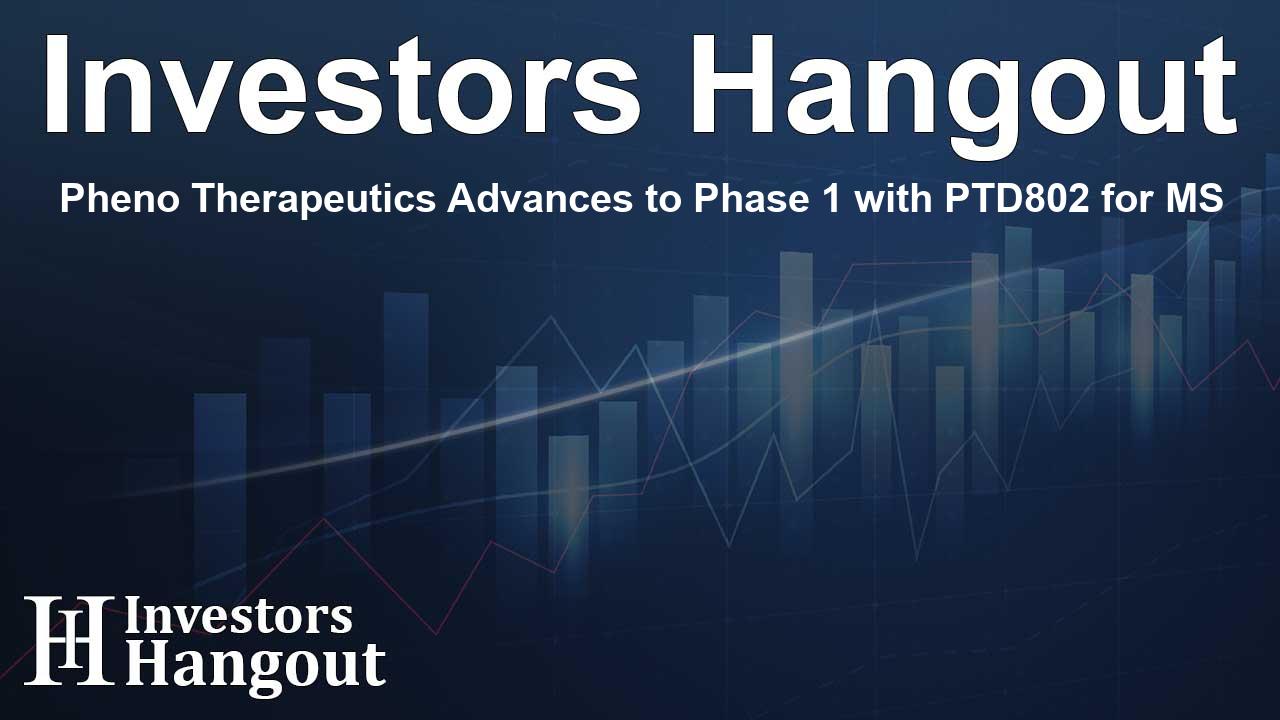Pheno Therapeutics Advances to Phase 1 with PTD802 for MS

Pheno Therapeutics Advances Clinical Development of PTD802
Pheno Therapeutics Limited, a biotechnology company dedicated to the discovery and development of innovative small molecule therapeutics aimed at treating neurological diseases, is making significant strides by announcing the receipt of clinical trial authorization (CTA) for its lead therapeutic candidate, PTD802. This important development reflects the company’s commitment to addressing high unmet medical needs in neurological care.
Understanding PTD802 and Its Mechanism
PTD802 operates as a selective antagonist for GPR17 (G protein-coupled receptor 17), acting as a revolutionary small molecule therapeutic focused on promoting remyelination. This candidate has been developed under an exclusive worldwide licensing agreement with UCB, targeting neurological conditions that currently have limited treatment options. The initial emphasis is on multiple sclerosis (MS), a condition that poses significant challenges for those affected.
The Impact of MS on Patients
Multiple sclerosis is characterized by demyelination, where the immune system mistakenly attacks the protective myelin sheaths that encase nerve fibers in the central nervous system. This damage can lead to a myriad of neurological challenges, including multifocal demyelination and neurodegeneration. Current treatments primarily aim to control inflammation but often fall short in preventing the progressive disability that MS can enforce on patients' lives.
Urgent Need for Innovative Treatments
The pressing demand for more effective therapies is echoed by Professor Siddharthan Chandran, the Co-Founder of Pheno Therapeutics. He emphasizes that while existing MS medications focus mainly on reducing the severity and incidence of relapses, there remains an essential need for treatments that actively delay disability progression. In his view, therapies promoting remyelination could offer profound protective benefits for those battling MS.
Comments from Company Leadership
Fraser Murray, PhD, the Chief Executive Officer of Pheno Therapeutics, conveyed excitement about receiving approval from the MHRA to transition PTD802 into a Phase 1 clinical trial. He stated, “This milestone highlights our evolution into a clinical-stage organization as we pioneer the administration of a selective GPR17 antagonist in healthy human subjects.” His remarks point toward an ambitious pursuit of developing transformative pharmacological treatments for diseases associated with demyelination.
The Promise of GPR17 Antagonists
While PTD802 is primarily targeted at multiple sclerosis, it is noted that GPR17 antagonists have potential beyond just one neurological ailment. The positioning of PTD802 as a first-in-class oral remyelination agent opens up discussions about its use in combinatorial treatment approaches aimed at halting the progression of MS and potentially other related conditions.
Looking Ahead at Clinical Developments
The progression into the clinical phase signals an exciting time for Pheno Therapeutics as they embark on this journey of delivering groundbreaking therapies. If successful, PTD802 could not only mark a new chapter in the treatment of multiple sclerosis but could change the landscape of therapeutic options available for various neurological disorders connected to demyelination.
Frequently Asked Questions
What is PTD802?
PTD802 is a selective GPR17 antagonist developed by Pheno Therapeutics, aimed at promoting remyelination in neurological diseases, primarily multiple sclerosis.
Why is PTD802 important for MS treatment?
It addresses a critical gap in current MS therapies that focus mainly on controlling inflammation rather than preventing disability progression.
What milestone has Pheno Therapeutics achieved recently?
Pheno Therapeutics has received clinical trial authorization from the MHRA to initiate a Phase 1 trial for PTD802.
What does a Phase 1 trial involve?
A Phase 1 trial typically assesses the safety, tolerability, and pharmacokinetics in healthy human participants.
How could PTD802 impact the treatment landscape?
If successful, PTD802 could usher in a new era of treatment options that focus on remyelination, potentially changing outcomes for MS patients significantly.
About Investors Hangout
Investors Hangout is a leading online stock forum for financial discussion and learning, offering a wide range of free tools and resources. It draws in traders of all levels, who exchange market knowledge, investigate trading tactics, and keep an eye on industry developments in real time. Featuring financial articles, stock message boards, quotes, charts, company profiles, and live news updates. Through cooperative learning and a wealth of informational resources, it helps users from novices creating their first portfolios to experts honing their techniques. Join Investors Hangout today: https://investorshangout.com/
Disclaimer: The content of this article is solely for general informational purposes only; it does not represent legal, financial, or investment advice. Investors Hangout does not offer financial advice; the author is not a licensed financial advisor. Consult a qualified advisor before making any financial or investment decisions based on this article. The author's interpretation of publicly available data shapes the opinions presented here; as a result, they should not be taken as advice to purchase, sell, or hold any securities mentioned or any other investments. The author does not guarantee the accuracy, completeness, or timeliness of any material, providing it "as is." Information and market conditions may change; past performance is not indicative of future outcomes. If any of the material offered here is inaccurate, please contact us for corrections.